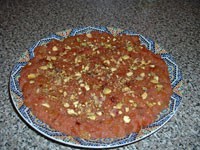Hanania: An Arab American Thanksgiving
Thanksgiving is a special holiday for me because no other American event better symbolizes my family’s Arab experience in this country.
My dad, George, immigrated to Chicago in 1926. He moved in with an older brother, Mousa (Moses) after another brother between their ages, Yusef, had drowned while swimming at the quarry outside of West Jerusalem.
The police reports noted that bystanders nearby refused to help him with Jews believing he was Arab, Muslims believing he was Jewish and Christians believing he was a Jew. That hatred, only a few years old at the time, has become the actualization of today’s Arab-Israeli conflict. Although my dad could not foresee the tragedy that was unfolding in Palestine, it was too much for him and he decided to find a place where people could live without the hate.
That place, he felt, was America.
When the Japanese attacked Pearl Harbor, the Sept. 11, 2001 terrorist attack of his generation, the two brothers went to the recruiters and enlisted. My dad went into the 5th Army and was assigned to Donovan’s famous OSS Division (later the CIA) in Europe. His brother, who wanted to serve with him, was sidetracked by the recruiter who asked him his name. When he heard “Moses,” the recruiter assigned him to the Navy. He didn’t part the seas but he served as a cook. Both served honorably for the entire duration of the war.
My dad married a wartime sweetheart in 1947, the same year that war had broken out between Jews and Arabs in his homeland. Tragically, his wife died giving birth to my brother on Christmas Eve, 1948, the same year my dad’s passport from “Palestine” was voided by Israel’s declaration of Jewish statehood. My father’s family was Orthodox Christian.
Dad essentially became a refugee when Israel prohibited Christian and Muslim Palestinians who lived in Palestine prior to the war, from returning to their homes and lands. His two other brothers and their families fled to refugee camps in Jordan and in a short time, my dad and his brother helped bring them to America, too.
After a few years, his family convinced him to go back to Palestine, that part not occupied by Israel, to find a wife. He saw my mother gathering water from the well outside of the Church of the Nativity in Bethlehem and they were married four weeks later.
George and Georgette bought their first house, a little two-story Georgian, on Chicago’s Southeast Side, a neighborhood where Jews and Arabs huddled together despite their brewing conflict 9,000 miles away, and I was born.
Although there were many great holidays to celebrate, my dad always talked about the freedoms that we had in this country and the one holiday that brought the family together was Thanksgiving.
Food has a special place in our hearts as Arabs, so Thanksgiving was the one American holiday we most loved; food symbolizes the essence of freedom, the ability to raise and feed your family without fear.
I’d listen as my dad, his brothers and cousins debated the Middle East conflict. Each year, the conflict became more and more a part of our lives. We loved America but we loved Palestine, too.
We knew there were some people who did not like Arabs. No one spoke of Muslims in the 1960s. We were all one culture and people. Arabs. Christian and Muslim. But for the most part, we were just a part of the American melting pot, another unintended allegory on food.
Well, now many years later, the world has changed. It’s not “Arab” any more, it’s “Muslim.” And the animosity we knew that lurked in the shadows of American society in the 1950s and 1960s is today out in the open, even among some friends.
Every time someone Middle East-looking commits an act of violence, it’s now the fault of everyone who is or even looks Muslim or Arab. The mainstream American media, ignorant about the facts in 1948 and even more ignorant and abusive today, plays up those fears. Americans insist they are compassionate, yet among them are vast numbers of bigots and racists. They say they are educated yet they don’t even know the fundamentals about the Middle East conflicts that consume their lives, foreign policies and billions of dollars each year in taxes. It’s tragic to see that in a country so educated, some still act so much like a mob.
My Thanksgiving table is generally the same, a mix of American and Arab traditions. We’ll have the stuffed turkey, but oftentimes it will be stuffed with rice and minced lamb. We’ll have grape leaves and zucchini (also stuffed with spiced rice and lamb), and tabouleh, a diced salad with burghal of cracked wheat. We have “spheeha” (mini Arab pizzas) and “kruss” (meat or spinach baked in triangular shaped bread).
It’s not ironic that my wife, today is Jewish. People are sometimes surprised by the relationship. In truth, Jews and Arabs have all lived a similar life, though not in sync. Persecuted, hated, and victimized, holidays that bring the family together like Thanksgiving give us shelter from the world’s endless woes.
Maybe one day Arabs and Israelis will be together as a people, too. Maybe one day Americans will be able to control those in their society who use hate and anger to drive their politics. Maybe one day people can take pride in their culture and ethnic heritage in the American melting pot that hasn’t melted because of being targeted or harassed in grocery stores, denied jobs or excluded out of fear.
“Maybe one day,” is my Thanksgiving wish this year.
Ray Hanania
Huffington Post



